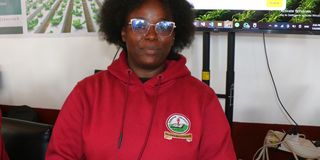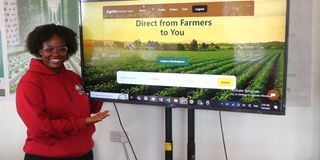Farming meets tech: Kabarak University student builds app that links Nakuru farmers directly to buyers

Ivy Muthoni, a fourth-year IT student in the Department of Computer Science and IT at Kabarak University, at the Nakuru ASK show on July 4, 2025.
Although agriculture remains the backbone of Nakuru County’s economy and a key contributor to the country’s food supply, small scale farmers continue to struggle with one of the sector’s oldest challenges: middlemen who reduce their profits and control access to markets.
However, a university student is hoping to change this.
Ivy Muthoni, a fourth-year IT student at Kabarak University's Department of Computer Science and IT, has developed a mobile and web-based app designed to connect farmers directly with suppliers and consumers. This aims to eliminate exploitative brokers and give producers more control over their produce and pricing.
AgriGo is an agritech platform that connects farmers with reliable buyers and buyers with trusted sellers.
“The idea came after several frustrating experiences with e-commerce platforms. No one on the back end understands the stress that buyers face when products arrive spoiled or not as expected, which leads to a lack of trust," Muthoni says.
She adds: 'Agri marketplaces face the same problem. Buyers don’t trust that they’ll get what they paid for, and farmers worry that they won’t be paid, or that their produce will go to waste if they cannot reach buyers in time, or if they encounter unreliable buyers. I wanted to build an app where trust is the foundation.”
Determined to bridge this gap, Muthoni began conducting field research in greenhouses and rural farms. She met farmers who had experienced these issues and were willing to trial the system.

Ivy Muthoni, a fourth-year IT student at Kabarak University's Department of Computer Science and IT, presenting her app interface at the Nakuru ASK show on July 4, 2025.
AgriGo offers several features designed to boost usability. Users can create profiles, search listings by category and track orders. An inbuilt chatbot helps users, especially those who are unfamiliar with technology, to navigate the platform.
“We also have a team on the ground to onboard farmers and geolocation features to help verify user authenticity. This helps to build trust between buyers and farmers,” she says
The platform also includes a secure payment feature designed to protect both buyers and sellers during transactions.
To make the platform more inclusive, particularly for small scale farmers, AgriGo uses a flexible commission model developed in consultation with users.
“We come to an agreement with each farmer on the commission. The goal is a win-win situation where everyone is happy: farmers get fair prices and buyers get reliable products,” Muthoni explains.
The app supports three main user groups: farmers, suppliers and everyday consumers. Institutions such as schools and wholesalers can benefit from bulk purchasing options.
“We want to eliminate brokers because they distort the market. With this system, farmers can upload details of anything they want to sell and get connected to real buyers,” she says.
Muthoni hopes that, in the future, AgriGo will evolve into part of a broader digital ecosystem for farmers — a one-stop platform offering support across the entire agricultural value chain, from seed access to smart farming tools and livestock care.
“I think this innovation will grow into something bigger, where farmers can find everything they need in one place,” she says.
Dr Andrew Kipkebut, the Coordinator of Innovation and Business Incubation at Kabarak University, says that the main goal in developing the app was to provide farmers with more marketing options for their produce, as many often struggle to access reliable markets.
The push to develop the e-commerce platform was also influenced by the government’s subsidised fertiliser programme, which was expected to boost production.
"With an increase in farm output, we needed to help farmers manage and sell their produce efficiently. That’s where digital solutions like this come in to support precision agriculture," he says.
"We also wanted to help farmers reduce the cost and burden of transporting their produce to market themselves," he explains, noting that development of the web-based platform began in October 2024 and is ongoing.


